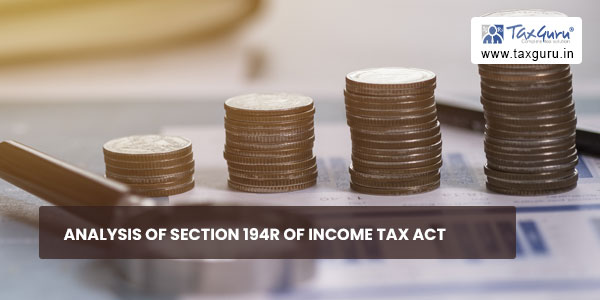Analysis of applicability of section 194R
Finance Bill 2022 has proposed to insert Section 194R in the Income Tax Act, 1961 (“Act”). As per the memorandum explaining the provisions in the Finance Bill, this change shall take effect from 1st July 2022, though the section has been inserted from 1st April 2022 itself. In this update, we shall discuss the background and applicability of the proposed provisions in detail and clarify various queries received at our end.
A. Legal Provisions
Clause (iv) of section 28 of the Act
Section 28(iv) of the Act provides that the value of any benefit or perquisite, whether convertible into money or not, arising from business or exercise of profession is to be charged as business income in the hands of the recipient of such benefit or perquisite.
Deduction of tax on benefit or perquisite in respect of business or profession – Sec 194R
Proposed section 194R states “Any person responsible for providing to a resident, any benefit or perquisite, whether convertible into money or not, arising from business or the exercise of a profession, by such resident, shall, before providing such benefit or perquisite, as the case may be, to such resident, ensure that tax has been deducted in respect of such benefit or perquisite at the rate of ten per cent of the value or aggregate of value of such benefit or perquisite:
Provided that in a case where the benefit or perquisite, as the case may be, is wholly in kind or partly in cash and partly in kind but such part in cash is not sufficient to meet the liability of deduction of tax in respect of whole of such benefit or perquisite, the person responsible for providing such benefit or perquisite shall, before releasing the benefit or perquisite, ensure that tax has been paid in respect of the benefit or perquisite:
Provided further that the provisions of this section shall not apply in case of a resident where the value or aggregate of value of the benefit or perquisite provided or likely to be provided to such resident during the financial year does not exceed twenty thousand rupees:
Provided also that the provisions of this section shall not apply to a person being an individual or a Hindu undivided family, whose total sales, gross receipts or turnover does not exceed one crore rupees in case of business or fifty lakh rupees in case of profession, during the financial year immediately preceding the financial year in which such benefit or perquisite, as the case may be, is provided by such person.
Explanation – For the purposes of this section, the expression “person responsible for providing” means the person providing such benefit or perquisite, or in case of a company, the company itself including the principal officer thereof.”
B. Rationale for bringing this TDS provision
Hon’ble Finance Minister in her budget speech has stated while introducing this provision that “It has been noticed that as a business promotion strategy, there is a tendency on businesses to pass on benefits to their agents. Such benefits are taxable in the hands of the agents. In order to track such transactions, I propose to provide for tax deduction by the person giving benefits, if the aggregate value of such benefits exceeds Rs.20,000 during the financial year.”
As per memorandum explaining the Finance Bill, following has been stated regarding the proposed section:
- As per clause (iv) of section 28 of the Act, the value of any benefit or perquisite, whether convertible into money or not, arising from business or exercise of profession is to be charged as business income in the hands of the recipient of such benefit or perquisite.
- In many cases, such recipient does not report the receipt of benefits in their return of income, leading to furnishing of incorrect particulars of income.
- This amendment will take effect from 1st July, 2022.
Thus, the captioned provision for deduction of tax at source is being inserted to put in place a mechanism to capture and detect such perquisites/ benefits which have largely remained unaccounted and thus untaxed despite there being a specific taxing provision due to their sheer nature.

C. Analysis of Section 194R
Section 194R in its present form would be a big compliance challenge for businesses as there are multiple types of perquisites & benefits which are extended to their dealers/ distributors/agents/ channel partners etc with the objective of incentivizing and motivating them for the growth of business. Some examples of common perquisites/ benefits are:
- Travel packages
- Gift Cards/vouchers
- Products under incentive scheme – Gold Coins/ Vehicles/ phones etc
- Usage of business assets etc
Considering the express language of Section 194R and specific linking of proposed section with clause (iv) of Section 28 in the memorandum, we can deduce following:
1. That transactions through issuance of credit notes would not be covered in the ambit of section 194R due to following reasons:
Expression used ‘whether convertible into money or not‘ would mean that benefit, which is provided will be liable for TDS, irrespective of whether the benefit is capable of conversion into money form or not. First proviso to section 194R also provides for cases where benefit is wholly in kind, benefit is partly in kind and partly in cash and in no case talks about benefit wholly in money.
Hon’ble Supreme Court was of the view that for section 28(iv) of the Act to be applicable, income must arise from business or profession and the benefit, which is received, has to be in some other form rather than in the shape of money. [2018] 93 taxmann.com 32 (SC)
It needs to be appreciated that transactions in money are in any case recorded in the books of accounts and suitable impact is given in ledger of other party. However, what is intended to be covered are those transactions which though are resulting into benefit to another person, however, still remains unaccounted.
2. Benefit or perquisite arising from business or exercise of a profession are only covered:
It is essential that the benefit or perquisite is linked to the business or profession of the recipient and then only it would come in the coverage hence there must exist nexus between the business of the recipient resident & benefit provided to him. Section 28(iv) aims at taxing fringe benefits that are availed in addition to consideration earned in carrying out a profession or while doing business.
Accordingly, we can say that when consideration is paid in the form of benefit or perquisite, section 194R will stand attracted.
3. Sale of goods or assets at a lesser/ discounted price would not be covered:
Under section 28(iv), it is the real income which is taxed and not hypothetical income which can be said to accrue on purchase at a lower price. Accordingly, TDS provision will be applicable only when there is actual benefit or perquisite.
For complying with the provisions of this section, the taxpayers have to ensure the following:
-
- The person responsible for deducting tax [‘Deductor’] shall ensure that TDS @ 10% is deducted before providing the perquisite or benefit.
- The Deductor shall deposit the tax deducted to the credit of central government on or before 7th day of the following month (30th April in case of month of March), using its ‘TAN’ Number.
- The ‘Deductor’ shall file quarterly TDS Returns in Form 26Q on or before the due dates specified in the act.
- The ‘Deductor’ shall issue certificate of tax deducted in Form 16A at quarterly intervals to the deductees.
- TDS would not be required in case the value or aggregate of value of benefit or perquisite provided or likely to provided in a financial year is upto INR 20,000/-
D. Clarifications required from Govt.
Based on our analysis of the proposed provisions and queries raised by taxpayers, we believe that for unambiguous and successful implementation of the section, the government has to clarify on many issues. Some of such issues have been listed below:
- The terms ‘benefits’ and ‘perquisites’ has not been separately defined for the purposes of Section 194R and these words are open ended, thus clarity on its coverage & scope is required.
- The basis of determining the value of benefit / perquisite has not been provided where they could not be converted in money.
- In case of non-monetary benefits / perquisites, the provider has been made liable to ensure that tax is paid on benefit / perquisite before releasing benefits / perquisites. The proposed provisions do not clearly state as to how the provider will ensure this.
- Many times, the perquisite or benefit is extended to employees on behest of their employer, whether those transactions would also be covered?
******
(Author can be reached at dinesh.singhal@snr.company or cadineshsinghal@gmail.com).
DISCLAIMER: The views expressed are strictly of the author. The contents of this article are solely for informational purpose and for the reader’s personal non-commercial use. It does not constitute professional advice or recommendation. Author do not accept any liabilities for any loss or damage of any kind arising out of any information in this article nor for any actions taken in reliance thereon. Further, no portion of our article or newsletter should be used for any purpose(s) unless authorized in writing.






Qtrly. Return form for TDS 194(R),not yet prescribed or loaded in portal, to file the statement timely. Kindly help. R. K. Mkakharia, Raipur, CG.
Notification 67/2022 194R Section Code is shown but same is not given in 26Q rpu version.
Could any one guide over same
Many times, the perquisite or benefit is extended to employees on behest of their employer, whether those transactions would also be covered?
In My opinion , the above will not be covered as the same is not taxable in the hands of employees as Perquisite u/s 28
In the hands of employees the taxability would not be there as correctly stated by you. However the question is whether that would be covered in the ambit of taxability of their employer as business income??